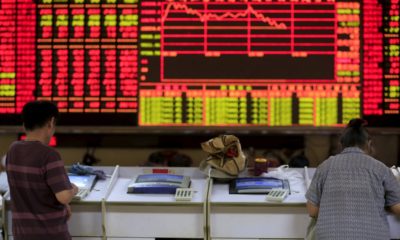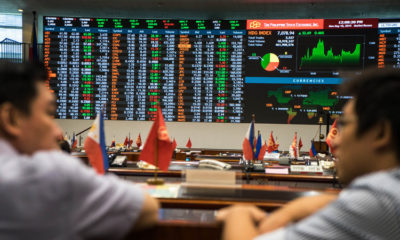Asian stocks slipped as the dollar advanced on Thursday after hawkish comments from Federal Reserve Chair Janet Yellen reinforced the case for an interest rate hike later this month.
Spreadbetters saw Britain’s FTSE .FTSE, Germany’s DAX .GDAXI and France’s CAC.FCHI opening down in line with Asian stocks.
Australian shares fell 0.6 percent and South Korea’s Kospi .KS11 shed 1 percent. Shares in Hong Kong, Malaysia and Singapore also declined.
Shanghai shares .SSEC bucked the trend and were last up 0.5 percent, brushing aside a Caixin/Markit Purchasing Managers’ Index showing China’s services sector growth cooling in November. Weak indicators often stir hopes of government stimulus, providing a burst of support for Chinese shares.
Japan’s Nikkei .N225 eased from 3-month highs and stood nearly flat, bound in narrow range as a wait-and-see mood prevailed ahead of the European Central Bank’s policy decision due later in the session.
Fighting stubbornly low inflation, the ECB is expected to deliver measures that could include a deposit rate cut and changes to its asset-buying program.
“The ECB’s decision will likely set the direction for the Japanese market tomorrow and beyond, but it’s also true that the market is seen overbought recently,” said Hikaru Sato, a senior technical analyst at Daiwa Securities in Tokyo.
MSCI’s index of Asia-Pacific shares outside Japan .MIAPJ0000PUS fell 0.5 percent after Wall Street slid overnight on Yellen’s comments.
The Fed chair said Wednesday she was “looking forward” to a U.S. interest rate hike that will be seen as a testament to the economy’s recovery.
Her comments come after expectations for a Fed rate hike at the central bank’s Dec. 15-16 policy meeting were slightly shaken by poor manufacturing data released earlier in the week.
However, faith in the U.S. economy was partially restored by Wednesday’s stronger-than-expected ADP private employment report. ECONUS
The dollar index advanced to a 12-1/2-year high of 100.51 .DXY following Yellen’s comments and the upbeat data. It last stood at 100.13.
The euro dipped 0.2 percent to $1.0594 EUR= as the markets braced for the ECB.
“There is great potential for euro volatility as the ECB announces its policy decision, followed by the press conference by President (Mario) Draghi starting 45 minutes later,” wrote Sean Callow, a senior strategist at Westpac.
“Draghi and selected colleagues have clearly signaled that there is sufficient risk of undershooting the ECB’s inflation target to warrant further loosening of monetary settings.”
While the prospects of further ECB easing dogged the euro, expectations of added stimulus have lifted European stocks. The pan-European FTSEurofirst 300 index .FTEU3touched a 3-month high this week.
In commodities, crude oil bounced modestly on bargain hunting following a tumble overnight prompted by surging U.S. stockpiles and a stronger dollar.
U.S. crude CLc1 was up 1.2 percent at $40.43 a barrel after tumbling 4 percent overnight. Crude was still capped with OPEC widely expected not to opt for a production cut at Friday’s meeting despite a global supply glut.
Spot gold XAU= stooped to $1,045.85 an ounce, its lowest since February 2010. Higher interest rates would diminish the allure of non-yielding gold and a stronger greenback makes the dollar-denominated metal more expensive for buyers.
Industrial metals also remained under pressure amid global oversupply and shrinking Chinese demand, with spot iron ore prices plumbing 10-year lows this week.
Three-month copper on the London Metal Exchange CMCU3 was down 0.5 percent at $4,540.50 a ton. Copper edged back toward a 6-year low of $4,443.50 touched late last month with pleas for Chinese government intervention providing little tonic.
China’s major copper producers asked the government this week to buy the metal, joining a growing chorus in the country’s base metal industry that is pleading for state intervention.
Reuter


 Billionaire Watch3 weeks ago
Billionaire Watch3 weeks ago
 Startups4 weeks ago
Startups4 weeks ago
 News4 weeks ago
News4 weeks ago
 News4 weeks ago
News4 weeks ago
 Bitcoin4 weeks ago
Bitcoin4 weeks ago
 Naira4 weeks ago
Naira4 weeks ago
 Forex3 weeks ago
Forex3 weeks ago
 Treasury Bills4 weeks ago
Treasury Bills4 weeks ago
























